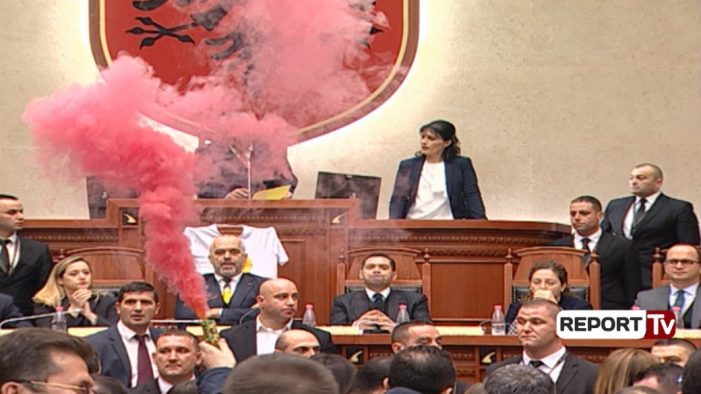
Arta Marku was yesterday undoubtedly the most courageous Socialist. So much that those who led the January 21 protests look like dilletantes in front of a woman, who understood more clearly than any rilindas in Parliament that her place was the one determined by the ruling majority. Just like it was clear that the procedure through which she was elected was as anticonstitutional as a part of a farce between colleagues, when it was clearly known that she would triumph with the blessing of Edi Rama.
But the vote on Marku was yesterday also the reason of the first true and serious battle between the opposition and the attempts of the Rama 2 government to also take control over the General Prosecutor. The predetermined election of a candidate of the majority – or constitutional coup as Lulzim Basha called it – is no doubt an unprecedented act of the card-carrying majority. Even so, it was a bit difficult for the citizens to understand and massively respond to.
The debate full of juridical terms that accompanied this process, the delay in the investigations of former minister Tahiri, the failure to start the investigation of other high officials suspected of being involved in criminal affairs, have no doubt created a group of skeptics who still doubt the veracity of the links of segments of the majority with the world of crime.
And to clarify: the nomination of Arta Marku will hardly help. Not as much because of the nomination itself, as because of the way in which she got to her pink-smoked vote.
Edi Rama was clear from the beginning that the end of the mandate of the General Prosecutor would mean the end of a cold-blooded period in which any moment a “bomb” could explode – a dossier about him or one of his close collaborators. And that’s why he prepared the situation, starting with the replacement of the General Prosecutor, which was completely controlled by the majority.
Even though he tried, he didn’t manage to involve the opposition in this trap which nevertheless caught the attention of the internationals. The US embassy and the EU delegation in Tirana, despite the declarations of the opposition and public voices against the election of a Temporary General Prosecutor, supported Rama to elect a new one with a simple majority.
They supported precisely the same prime minister that had ignored the calls of ambassador Lu to dismiss Elvis Rroshi, Armando Prenga, and a few others. But this time he trusted them blindly, even though he clearly risked violating the Constitution and the vetting so beloved to the internationals. With the support of the foreigners and through an unprecedented procedure of a simple majority, Rama blessed yesterday the new General Prosecutor while the diplomatic missions in Tirana worried more about material damages than about a new prosecutor without vetting.
They supported Rama, the politician who in the previous legislature put at least 6 deputies with criminal pasts in Parliament and whose former right hand is accused of being involved in a criminal organization. At a time when the opposition speaks about the other dossiers that are “sleeping” at the Prosecution of Serious Crimes, when the wiretaps that flow to the media are the topic of a broad public debate about the involvement of the police in the cultivation and trafficking of narcotics, the Prime Minister blessed the new Temporary Prosecutor, who probably will stay there until Rama has secured a civil society member who can be elected to the High Prosecutorial Council.
That’s why the parliamentary session of yesterday turned into a battlefield not because of Arta Marku, but of the clutches of the government that have now taken hold of the only institution not ruled by the majority. This is the final battle of the opposition with the Rama government. Any compromise in the face of this situation would be the complete ruin of the opposition. This serves no one better than the prime minister, who is ready to set fire to the country just for a Temporary Prosecutor, who could protect him temporarily from the currently existing dossiers of new investigations, even though with his 69 votes will not suffice to protect him from the revolt of the citizens who believe that Rama’s government is so much involved in crime that it should be removed from power.
And if this is the true aim of the opposition, it will have to prove this by any means. And from that no temporary or permanent prosecutor, no militant sworn in in the name of the Socialists in a smoky parliament, will be able to save Rama.

